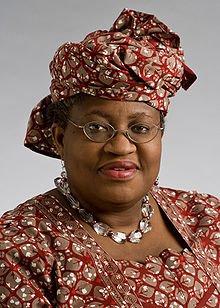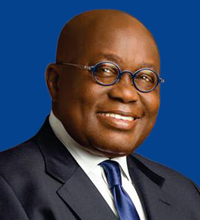The shifting balance of complex forces of political change and governance indicates that a window for democratic breakthroughs has widened in Africa. “The continent aspires to be governed differently,” Chris Fomunyoh, working group member and Regional Director for Africa at the National Democratic Institute, told attendees. Meanwhile, the strengthening of civil society, legislatures, elections, and a range of other democratic institutions in Africa has chipped away at the monopoly on power of the executive branch. This process has also placed more pressure on Africa’s authoritarians and autocrats.
North Africa’s dramatic repudiation of autocratic rulers during 2011’s Arab Spring is adding new vitality to Sub-Saharan Africa’s governance landscape, a report from a working group of experts convened by the Africa Center for Strategic Studies (ACSS) has found.
The November 2011 report,
Africa and the Arab Spring: A New Era of Democratic Expectations, is the first volume of the Africa Center’s new
Special Report series. During an
ACSS roundtable at the National Defense University on November 16, three coauthors of the report presented their findings and responded to questions from an audience of 120. Attendees included members of the African diplomatic corps, the
U.S. government interagency, academic institutions, think tanks, and nongovernmental organizations, among others.
The panelists noted that the often asked question “What effects will the Arab Spring have on Africa?” largely has the sequence backwards. Rather, Africa has been democratizing to varying degrees for two decades. And it is this range of complex processes that is driving democratic change in Africa today – in tandem with and parallel to the Arab Spring.
Ripple effects from the Arab Spring are indeed visible across the continent. Protests have occurred in more than a dozen African capitals in 2011. Demonstrators, activists, opposition leaders, and journalists have explicitly drawn direct connections between the events in North Africa and recent protests and public debates about legitimate claims on authority in their own countries.
Yet many of the key democratic breakthroughs in Sub-Saharan Africa this year – including in Côte d’Ivoire, Guinea, Niger, and Nigeria – were not the result of street revolutions, as witnessed in North Africa. Some have lamented that recent protests in Africa have yet to topple a government, “but this is an incomplete indicator of progress since protests alone are not able to sustain political change,” explained Dr. Joseph Siegle, the working group chair and Research Director at ACSS.
“Still, the Arab Spring has resonated deeply in Africa – and is contributing to changed expectations citizens have of their governments. In this way, the Arab Spring is serving as a catalyst to political reform in Africa,” he continued.
Crosscurrents of Change in a Dynamic Landscape

While the Arab Spring has been the focus of conversation and analysis, the report states, a momentous year for democracy south of the Sahara has gone largely unnoticed. For example, watershed elections were held in Guinea, Nigeria, Niger,
Côte d’Ivoire, and Zambia. Niger and Guinea, meanwhile, reversed the corrosive effects of military coups.
Such events reflect the increasingly robust forces driving democratic change in Africa. Over the last decade in particular, elections have become increasingly regular and courts, legislatures, local governments, and other institutional checks and balances have functioned more effectively. Civil society has also grown more sophisticated and influential. Access to information and communications technology has diversified and grown exponentially, enhancing the ability for collective action. Regional and international standards have risen as well, directly contributing or prompting governance improvements in some African countries.
While the drivers of democratic change in Africa have accelerated in recent years, significant countervailing forces remain. Forty percent of states in Sub-Saharan Africa remain organized on authoritarian principles, and half of this group feature distinctly autocratic regimes. Africa’s legacy of “big man” politics is still strong in many countries, and remains a key impediment in Africa’s leading democracies. Civil society remains weak in many parts of Africa and some authoritarian regimes are able to coopt opposition through patronage networks, which are often maintained through control of substantial natural resource endowments. The fallout from the collapse of the Gaddafi regime, especially the flow of arms and trained mercenaries in the Sahel, poses particularly severe challenges to regional neighbors.
“The future trajectory of democratic governance in Sub-Saharan Africa,” the report concludes, “will be determined by the tension between these competing forces.”
A focus on relative progress, then, is critical. Change will be marked by advances and backsliding. Setbacks will not be uncommon, nor will they necessarily be permanent.
The Democratic Calculus Has Shifted
The shifting balance of complex forces of political change and governance indicates that a window for democratic breakthroughs has widened in Africa. “The continent aspires to be governed differently,” Chris Fomunyoh, working group member and Regional Director for Africa at the National Democratic Institute, told attendees.
Meanwhile, the strengthening of civil society, legislatures, elections, and a range of other democratic institutions in Africa has chipped away at the monopoly on power of the executive branch. This process has also placed more pressure on Africa’s authoritarians and autocrats.
Some African leaders have even betrayed a sense of weakness in their response to the Arab Spring, entirely prohibiting discussion of the topic, usually with little success given that their fellow citizens are “wired in” to regional events and democratic norms through cell phones, the internet, and independent media.
The Arab Spring also “raised awareness of the important role of citizen action in democracies,” explained Dr. Siegle. Democratic change is not a onetime push against a single individual or leader, but requires sustained popular participation and extensive organization across civil society groups.
Change is also occurring at the ballot box. While 19 African leaders have been in power for more than a decade, in some regions a whole new generation of leaders have emerged. Only 3 heads of state in West Africa have been in power for more than 10 years, for example.
Partners Should Value Legitimacy
Dr. Fomunyoh explained that though a confluence of forces seems to strengthen the prospects for democratic change on the continent, “old habits die hard, and so we should expect autocratic pushback.”
Regional and international partners have important roles to play in facilitating smooth transitions on the continent. A starting point should be to empower the continent’s Regional Economic Communities (RECs). Several of the RECs have been at the vanguard of advancing democratic norms and pressuring recalcitrant leaders to implement real reform. Most importantly, as peers they have the credibility and diplomatic tools to manage political change.
The African Union has been several steps behind some of the RECs in recent transitions, especially Libya and Côte d’Ivoire. With the ratification of the African Charter on Democracy, Elections and Governance expected soon, the African Union will be compelled to support democratic principles on the continent more vigorously.
Other efforts can be made to strengthen Africa’s civil society networks so that they can act more cohesively. Similarly, Africa’s journalists and information technology entrepreneurs need to be protected so that the media sector can play its educational, informational, and oversight role. A focal point of attention needs to be the professionalization of the security sector, which continues to be used to support a particular leadership rather than the institutions of the state.
The overarching litmus test for engagement should be legitimacy. Policies and assistance on the continent should more consistently support and favor democratic practices and norms – as this will contribute to more stability, economic growth, and development effectiveness.
While resistance to democratic reform can be expected to persist, the report concludes, such resistance ignores a principal lesson of recent transitions in Egypt, Tunisia, Libya, and Côte d’Ivoire: “those leaders who stay in power too long are likely to depart on terms considerably less favorable to themselves.”
Welcome remarks by Ambassador William M. Bellamy (ret.), Director of the Africa Center for Strategic Studies and comments by Joseph Siegle, Working Group Chair and ACSS Director of Research , Christopher Fomunyoh, National Democratic Institute’s Regional Director for Africa , Edward McMahon, University of Vermont Professor and Freedom House Senior Research Associate
Video link: http://www.youtube.com/watch?v=BQmbjmVAIIA&feature=player_embedded
Article link: http://africacenter.org/2011/11/catalyst-of-reform-the-arab-spring-in-africa/
Source: Africa Center for Strategic Studies

 While the Arab Spring has been the focus of conversation and analysis, the report states, a momentous year for democracy south of the Sahara has gone largely unnoticed. For example, watershed elections were held in Guinea, Nigeria, Niger, Côte d’Ivoire, and Zambia. Niger and Guinea, meanwhile, reversed the corrosive effects of military coups.
While the Arab Spring has been the focus of conversation and analysis, the report states, a momentous year for democracy south of the Sahara has gone largely unnoticed. For example, watershed elections were held in Guinea, Nigeria, Niger, Côte d’Ivoire, and Zambia. Niger and Guinea, meanwhile, reversed the corrosive effects of military coups.


